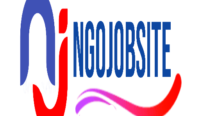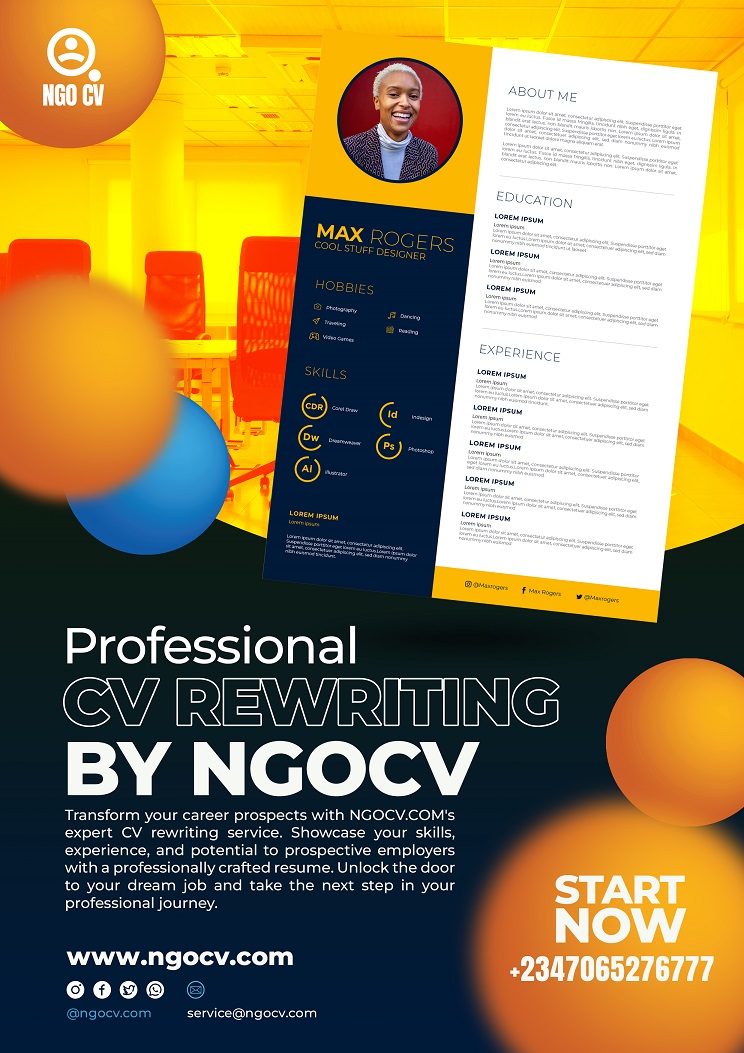
UNICEF contributes to the achievement of the Millennium Development Goals in Nigeria with a mandate to advocate for the protection of children’s rights, to help meet their basic needs and to expand their opportunities to reach their full potential. UNICEF’s Nigeria country programme: Aims to accelerate the realization of the rights of all children and women to survival, development, protection and participation. Promotes efforts to reduce infant, child and maternal mortality; expand access to quality basic education; and strengthen social and child protection systems. Uses a rights-based and gender-sensitive approach Plays a catalytic role in supporting federal, state and local governments in identifying key bottlenecks that hinder realization of the rights of disadvantaged children, supported by equity-focused, inclusive advocacy, planning, action and monitoring at all levels. Supports adolescent development.
- Job Type: Full Time
- Qualification: BA/BSc/HND
- Experience: 5 years
- Location: Sokoto
- Job Field: Education / Teaching
Under the guidance and general supervision of the Education Manager, P4 the Specialist supports the development and preparation of the Education (or a sector of) programmes and is responsible for managing, implementing, monitoring, evaluating and reporting the progress of education programmes/projects within the country programme. The Specialist provides technical guidance and management support throughout the programming processes to facilitate the administration and achievement of results on education programmes/projects to improve learning outcomes and equitable and inclusive education, especially for children who are marginalised, disadvantaged and excluded in society.
The Specialist contributes to the achievement of results according to plans, allocation, results-based-management approaches and methodology (RBM), as well as UNICEF’s Strategic Plans, standards of performance, and accountability framework.
Organizational Context and Purpose for the job
The fundamental mission of UNICEF is to promote the rights of every child, everywhere, in everything the organisation does — in programmes, in advocacy and in operations. The equity strategy, emphasising the most disadvantaged and excluded children and families, translates this commitment to children’s rights into action. For UNICEF, equity means that all children have an opportunity to survive, develop and reach their full potential without discrimination, bias or favoritism. To the degree that any child has an unequal chance in life — in its social, political, economic, civic and cultural dimensions — her or his rights are violated. There is growing evidence that investing in the health, education and protection of a society’s most disadvantaged citizens — addressing inequity — not only will give all children the opportunity to fulfill their potential but also will lead to sustained growth and stability of countries. This is why the focus on equity is so vital. It accelerates progress towards realizing the human rights of all children, which is the universal mandate of UNICEF, as outlined by the Convention on the Rights of the Child, while also supporting the equitable development of nations.
Key functions, accountabilities, and related duties/tasks
Summary of key functions/accountabilities:
- Support to programme development and planning
- Programme management, monitoring and delivery of results
- Technical and operational support to programme implementation
- Networking and partnership building
- Innovation, knowledge management and capacity building
Support to Programme development and planning
- Support the preparation, design and updating of the situation analysis for the education programmes to ensure that current and comprehensive data on education issues is available to guide UNICEF’s strategic policy, advocacy, intervention and development efforts on education programmes.
- Help the supervisor set priorities, strategies, design and implementation plans. Keep abreast of development trends to enhance Programme management, efficiency and delivery.
- Participate in strategic Programme discussions on the planning of education programmes. Formulate, design and prepare Programme proposals for the sector, ensuring alignment with UNICEF’s Strategic Plans and Country Programme and coherence/integration with the UN Development Assistance Framework (UNDAF), regional strategies and national priorities, plans and competencies.
- Establish specific goals, objectives, strategies and implementation plans for the sector using results-based planning terminology and methodology (RBM). Prepare required documentation for Programme review and approval.
- Work closely and collaboratively with internal colleagues and partners to discuss strategies and methodologies and to determine national priorities to achieve concrete and sustainable results.
- Provide technical and operational support throughout all stages of programming processes and to ensure integration, coherence and harmonisation of programmes/projects with other UNICEF sectors and achievement of results as planned and allocated
Programme management, monitoring and delivery of results
- Plan and collaborate with internal colleagues and external partners to establish monitoring benchmarks, performance indicators and other UNICEF/UN system indicators to assess/strengthen performance accountability, coherence and delivery of concrete and sustainable results for the assigned sector on education programmes.
- Participate in monitoring and evaluation exercises, Programme reviews and annual reviews with the government and other counterparts to assess progress and to determine required action/interventions to achieve results.
- Prepare and assess monitoring and evaluation reports to identify gaps, strengths and weaknesses in Programme management.
- Identify lessons learned and use the knowledge gained for development planning and timely intervention to achieve goals.
- Actively monitor programmes/projects through field visits and surveys, and exchange information with stakeholders to assess progress, identify bottlenecks and potential problems, and take timely decisions to resolve issues and/or refer to relevant officials for timely resolution.
- Monitor and verify the optimum and appropriate use of sectoral Programme resources (financial, administrative and other assets) confirming compliance with organisational rules, regulations/procedures and donor commitments, standards of accountability and integrity, ensuring timely reporting and liquidation of resources.
- Prepare regular and mandated Programme reports for management, donors and partners to inform them of programme progress.
Technical and operational support to Programme implementation
- Provide technical guidance and operational support to government counterparts, NGO partners, UN system partners and country office partners and donors on interpretation, application and understanding of UNICEF policies, strategies, processes and best practices and approaches on education and related issues to support Programme management, implementation and delivery of results.
- Arrange/coordinate the availability of technical experts with the Regional Office/HQ to ensure timely and appropriate support throughout the programming process.
- Participate in education Programme meetings including Programme development and contingency planning to provide technical and operational information, advice and support.
- Draft policy papers, briefs and other strategic Programme materials for management use
Networking and partnership building
- Build and sustain effective close working partnerships with relevant government counterparts, national stakeholders, global partners, donors, and academia through active networking, advocacy and effective communication to build capacity, exchange knowledge/expertise and to reinforce cooperation to achieve sustainable and broad results on education programmes.
- Prepare communication and information materials for CO Programme advocacy to promote awareness, establish partnerships and support fundraising for education programmes.
- Participate and/or represent UNICEF in appropriate inter-agency (UNCT) discussions on education and related issues to collaborate with inter-agency partners/colleagues on UNDAF planning and preparation of programmes/projects ensuring organisational position, interests and priorities are fully considered and integrated in the UNDAF process in development planning and agenda setting.
Innovation, knowledge management and capacity building
- Apply and introduce innovative approaches and good practices to build the capacity of partners and stakeholders and to support the implementation and delivery of concrete and sustainable programme results.
- Keep abreast, research, benchmark, and implement best practices in education management. Assess, institutionalize and share best practices and knowledge learned.
- Contribute to the development and implementation of policies and procedures to ensure optimum efficiency and efficacy of sustainable programmes and projects.
- Organize and implement capacity-building initiatives to enhance the competencies of clients/stakeholders to promote sustainable results on education and related programmes/projects.
Education:
- An advanced university degree in one of the following fields is required: education, economics, psychology, sociology, or another relevant technical field.
Experience:
- A minimum of five years of professional experience in Programme planning, management, and/or research in education is required.
- Experience working in a developing country is considered an asset.
- Relevant experience in a UN system agency or organization is considered as an asset.
Language Requirements:
- Fluency in English is required. Knowledge of another official UN language or local language of the duty station is considered as an asset.
Technical Competencies
Technical competencies must be demonstrated in the following areas:
- Some understanding of the overall global development context, including issues such as: poverty, conflict and the impact of these factors on education and vice-versa; and inter-sectoral approaches to address such issues in collaboration with other sectors (including Social Policy, Child Protection, Nutrition, WASH, Health, and Communications within UNICEF).
- Some knowledge of global developments in education and international engagement strategies, including the application of the equity lens and human rights perspectives to programming.
- Some ability to support policy dialogue: translation of analytical findings and evidence into development programme and policy discussions around equity and learning with partners, including government, development partners, CSOs and academia in relevant areas.
- Some education sector planning knowledge/ability, including the range of modalities for delivering education, linkages between different sub-sectors (e.g. ECD, Primary, Secondary, Tertiary, Inclusive Education), cost-effectiveness and efficiency issues, key institutional structures, components and processes, as well as governance issues.
- Some education and policy sector analysis capacity, including understanding of the core education data sets and indicators; tools for analysis of equity; determinants of student access and learning; budget, costing, and financial management in education systems; political economy; and education policy and strategic planning.
- Some programme management in education, including programme design, costing, monitoring and evaluation and reporting.
- Some ability to support engagement with partners e.g. Sector Wide Approaches, Global Partnership for Education, Education in Emergency Clusters, Education Provider Forums, Delivering as One, Inter-sectoral partnerships such as in ECD, as well as networking with other key partners.
- Some understanding of gender and inequity issues in relation to education and development and the application of gender / equity analysis to policy and planning in education.
- For CO and RO based posts and where relevant, some understanding of policies and strategies to address issues related to resilience: risk analysis and risk management, education in conflict situations, natural disasters, and recovery.




